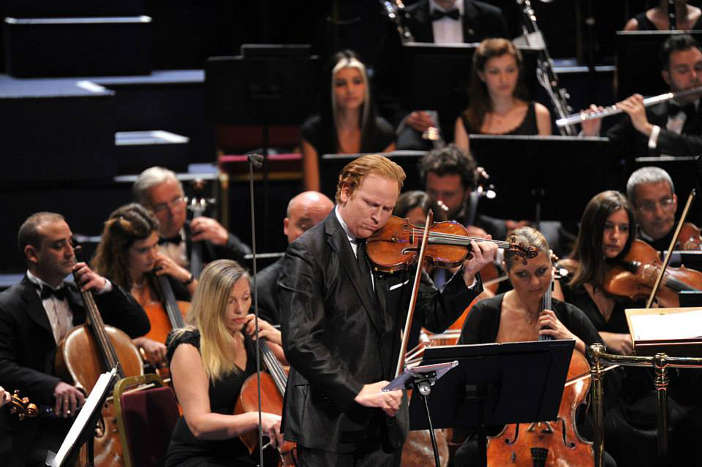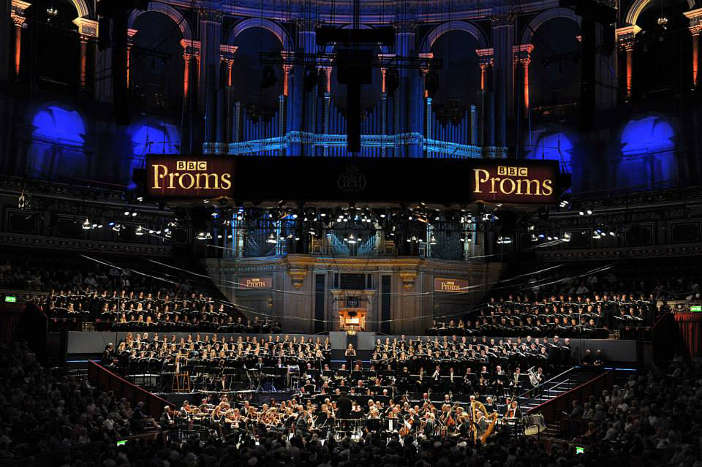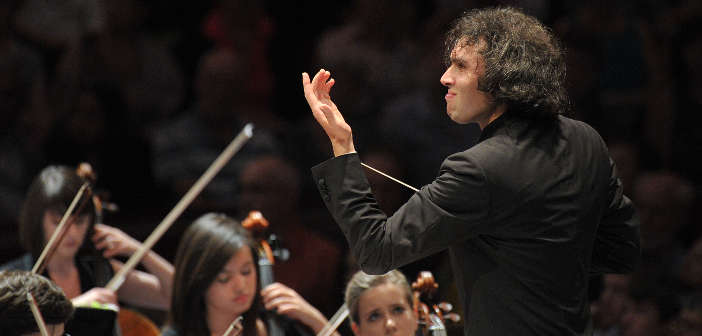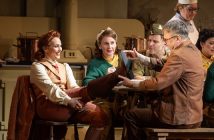The queues around the Royal Albert Hall illustrated how popular BBC Prom 56 was and a real highlight of this year’s season. The programme combined one of the best loved orchestral works, Gustav Holst’s The Planets, Op. 32, Schoenberg’s radical Five Orchestral Pieces, Op. 16 and the performance of Scriabin’s Prometheus: The Poem of Fire, Op. 60, with the première of lighting designer Lucy Carter’s innovative take on the composer’s imaginative ‘Colour Organ’ concept.
It may be hard to believe it now, but almost a hundred years ago The Planets suite was considered so avant garde that conductor Adrian Boult decided to play only five movements out of seven when he first unveiled the work to the public in 1919, believing (perhaps wisely) that his good friend Holst’s new composition would prove too overwhelming for the first invited audience of 250 at the Queen’s Hall. Boult was a champion of British music and Holst was extremely grateful to him, writing on his copy of the score: “This copy is the property of Adrian Boult who first caused The Planets to shine in public and thereby earned the gratitude of Gustav Holst.”
Not only were two movements neglected on first hearing, but Holst, through no fault of his own, was unable to write a movement dedicated to the planet Pluto due to it not having been discovered. Thought to have been written from 1914 and 1916 during the First World War, many have surmised this as the reason for the suite commencing with “Mars, the Bringer of War”, but Holst claimed the work was finished before the outbreak of the war.

Holst had first developed an interest in astrology when holidaying on the island of Majorca, Spain, during the spring of 1913 and became so fascinated in the subject and its many mysteries that he would cast his friends’ horoscopes to entertain. Each movement of the suite is named after a planet of the Solar System with the exception of Earth due to the concept being astrological rather than astronomical.
The first complete performance of the suite at a public concert did not occur until 1920 with the London Symphony Orchestra (LSO), conducted by Albert Coates. Glorious “Neptune”, which sounds like angels summoning you to the gates of heaven, was finally heard, with the ground-breaking inclusion of a pair of three-part women’s choruses who sung from an adjoining room and were screened from the audience.
From the menacing and violent qualities of Mars to the mystical, intergalactic qualities of Venus and playfulness of Jupiter, the suite was startlingly different from anything anyone had heard before, and it still feels as fresh and modern when performed today. Conductors of The Planets still consult Holst’s own recordings of 1923 and 1926 and Vladimir Jurowski guided the London Philharmonic Orchestra with a perfect balance between sheer ferocity and delicacy that was marvellous to witness.

Few works are as theatrical or exciting to see performed live as The Planets and, whether you pay for standing tickets or one of the plush boxes of the Royal Albert Hall, this work is the epitome of what The Proms was always meant to be – mesmerising. Consciously or otherwise, the suite unquestionably sounds like it influenced John Williams when composing the film score to Star Wars and Superman and the similarities are easily identified to anyone familiar with both composers’ works. Holst himself was dismissive of the work, although it unquestionably remains his best loved achievement.
Whilst The Planets is familiarity itself to modern audiences, the rest of the programme held more mystery and even trepidation. Schoenberg’s Five Orchestral Pieces are somewhat indigestible to me, however skilfully executed. The sound is too radical and impressionistic for my palate and each movement, from the Premonitions to The Obbligato Recitative, reminds me of reading a Virginia Woolf novel before bed.
Finally, there was a murmur of anticipation as we were treated to Lucy Carter’s take on Scriabin’s inventive concept of a special organ that projected a light for each note of music. It was a dream he was never to realise, making it all the more of a privilege for us to experience. As Prometheus: The Poem of Fire gathered pace so did the rainbow of light projected onto the columns of the hall and mirrored by a panel of light positioned behind the orchestra. As was Scriabin’s intention, each tone and inflection of the work was heightened to dazzling effect. The Proms are all about trying something new and this was a memorable introduction indeed. Who knows, perhaps in another hundred years all Proms will be in glorious technicolour.
BBC Proms 2014 at the Royal Albert Hall until 13th September 2014. On the day Promming tickets from £5. For more information and tickets visit the website.




